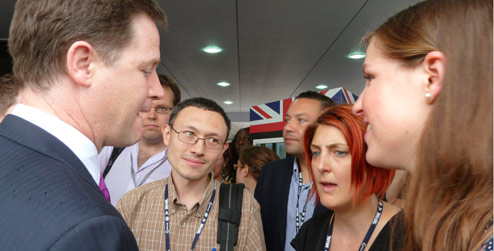
Progressio's Lis Martin speaking to Nick Clegg at the Rio+20 Summit (photo © Daniel Hale/Progressio)
What did Rio+20 achieve?
The 2012 Rio+20 sustainable development conference achieved a glass half full. It now has to be topped up by governments, business and NGOs 'at home'.
Ambition, urgency and commitment were lacking in the formal negotiations between governments. But there were many other events leading up to and during Rio+20 which showcased how civil society and business are already acting more sustainably, and demonstrated the energy and innovation that were absent in the negotiations. Outside the agreement, countries, businesses, and NGOs have been making commitments to sustainable development.
From this perspective, Rio+20 looks less like a 'giant leap', and more like 'a hundred small steps'.
The UK, for example, has made it mandatory for the top 100 companies listed on the stock exchange to disclose their greenhouse gas emissions. Countries and companies have signed up to 'natural capital' accounting and companies have committed to Corporate Sustainability Reporting. Brazil and the United Nations Development Programme have established a Centre for Sustainable Development.
The most significant step taken at Rio+20 is establishing a process that could deliver Sustainable Development Goals (SDGs). The process has the potential to create a set of universal goals that will put countries on a more sustainable development pathway - one that eradicates poverty, recognizes environmental limits and protects the planet for future generations. The process will include all 'relevant stakeholders' and therefore has the opportunity to consult with and include civil society from all over the world, to build inclusivity and ownership.
Why did Rio+20 fail to deliver the ambition necessary?
In the negotiations prior to Rio+20 it was clear that governments were unable to agree on substantive issues. Fundamental disagreements delayed and prevented progress at Rio+20. The main areas of contention centred around:
- The process for forming SDGs;
- Financing and how to turn words into actions;
- The Rio principles, in particular the reach of Common But Differentiated Responsibility.
The result of focusing on trying to get 194 governments to agree is a watered down, lowest common denominator text, in which most governments got some, but not all that they hoped for.
The statements made by Heads of State in the plenary talked about the numerous environmental and developmental challenges facing humanity today. The severity of these crises as described, however, has not been reflected in the text and did not result in a re-opened or altered text at the official summit.
Read more
Read Progressio's response to the Rio+20 Outcome Text
Read our advocacy brief A 'Waterproofed' Rio+20
Read our Rio+20 FAQs
Read our Rio+20 briefing for MPs
Read our response to the Zero Draft The future we need
Read Water in a green and fair economy - a Progressio briefing for those who want to know a bit more


